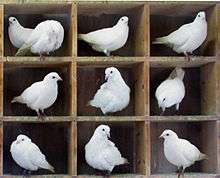Pigeonholing
Pigeonholing is a process that attempts to classify disparate entities into a limited number of categories (usually, mutually exclusive ones).

The term usually carries connotations of criticism, implying that the classification scheme referred to inadequately reflects the entities being sorted, or that it is based on stereotypes.[1]
When considering various classification schemes, one must be aware of the following pitfalls:
- Using categories that are poorly defined (e.g., because they are subjective).
- Entities may be suited to more than one category. Example: rhubarb is both 'poisonous' and 'edible'.
- Entities may not fit into any available category. Example: asking somebody from Washington, DC which state they live in.
- Entities may change over time, so they no longer fit the category in which they have been placed. Example: certain species of fish may change from male to female during their life.
- Attempting to discretize properties that would be better viewed as a continuum must be taken with caution. Example: while sorting people into 'introverted' and 'extroverted' one must keep in mind that most people exhibit both traits to some degree.
The term pigeonholing is sometimes used disparagingly during instances wherein one unnecessarily assigns masculine or feminine qualities to a topic, person or group as with overgenderization, when the situation could more reasonably have been referred to in a gender-neutral fashion.[2] Another example of pigeonholing in everyday conversation occurs when a person assigns wingism to apolitical or barely political people, without ascertaining what the political stance of this individual is. Such an erroneous designation is especially erroneous when assigning it to people who live in places where the right-wing left-wing dichotomy is not present.[3]
See also
- Archetype
- Labelling
- Pigeonhole principle
- Typecasting (acting)
References
- Oxford English Dictionary (Third ed.). March 2006. Retrieved 31 May 2011.
Online version March 2011. An entry for this word was first included in New English Dictionary, 1906.
- Bendall, Charlotte. "Some are more ‘equal’than others: Heteronormativity in the post-White era of financial remedies." Journal of Social Welfare and Family Law 36.3 (2014): 260-275.
- Lipset, Seymour Martin, and Asoke Basu. "The roles of the intellectual and political roles." The Intelligentsia and the Intellectuals: Theory, Method and Case Study (1976): 111-150.